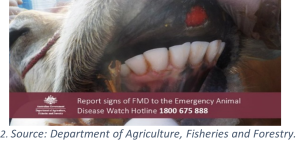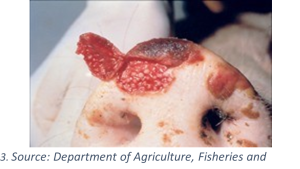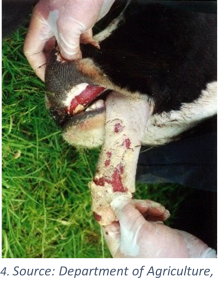Foot and Mouth Disease

We have been receiving a lot of questions regarding the recent outbreak of foot and mouth disease (FMD) in Indonesia. Below are some frequently asked questions to help your understanding of the disease.
What is foot and mouth disease?
Foot and mouth disease is a highly contagious viral disease that can cause serious production losses and if introduced, could have huge impacts on Australia’s international trade of livestock and livestock products. FMD affects cloven-hoofed animals (e.g. cows, pigs, goats, sheep, deer). The disease presents as blisters, ulcers and erosions that develop on the feet and in and around the mouth. FMD is present in many countries of Africa, the Middle East, South America, and Asia (now including Indonesia).
What are the signs to look out for in my stock?
Signs of FMD include:
- Blisters, ulcers or erosions on the tongue, lips, gum, in between the toes, bulbs of heels and teats
- Fever up to 42⁰C
- Lethargy
- No appetite, excessive drooling
- Loss of body condition
- Lameness or reluctance to walk
- Sudden and big drop in milk production
- Abortion of pregnant animals
- More than one animal affected
Should you detect two or more of the above signs in your cattle, please call the National Emergency Animal Disease Watch Hotline: 1800 675 888
How is FMD spread?
The virus is shed in large quantities in exhaled air and is spread through all secretions and excretions (e.g. saliva, urine, faeces, milk, semen and blood) from ruptured blisters and via contaminated feed & bedding. In Australia, it is illegal to feed waste food products (swill) to pigs as it has the potential to spread disease – in this case, foot and mouth disease.
Indirect spread can occur from animal transport vehicles, equipment, soiled clothing, and footwear.

Transmission of the virus to humans is very rare and the disease is different to hand-foot-and-mouth disease in children.
What is the risk of FMD entering Australia?
The risk of disease entering Australia and affecting our farms is low to moderate at this stage. We have Australian border protection measures in place to screen imported goods from high-risk countries and ensure travellers entering Australia abide by strict biosecurity standards.
What will happen in the event of an outbreak?
The current action plan in the event of an outbreak is to contain, control and eradicate the disease.
Should FMD be detected in animals in Australia:
- Our livestock export and trade markets will be severely affected and have large economic impacts.
- Animal welfare will be compromised.
- Trained personnel will be called upon to detect, diagnose and affected animals will most likely be eradicated.
- Eradication involves humane destruction & disposal (burial or burning) of infected animals.
- Affected farms will be quarantined and livestock will not be able to move on or off the property.
Australia has detailed response plans in place to manage animal health emergencies. The Department of Agriculture, Fisheries and Forestry collaborates with the states and territory authorities (Department of Primary Industries) to coordinate national responses to diseases such as FMD. Many veterinarians have also been trained in detecting and reporting the disease to help reduce the spread in the case of an outbreak.
What can I do to reduce the risk of it entering my farm?
Having an up-to-date biosecurity plan for your farm will help prevent diseases from entering your property. Measures include:
- Having all visitors that enter and leave the farm wash and disinfect their boots.
Disinfectant options:
Citric acid – 30g/L in water for 10 minutes
Virkon – 20g/L in water for 10 minutes
- Having accurate records of all animals that enter and leave the farm.
- Ensuring all animals have traceable NLIS tags in place.
- Secure, pest proof fencing.
The Veterinary Team at the LVS can help create and/or review your biosecurity plan. To get started, generic biosecurity plans are available on the Animal Health Australia Farm Biosecurity website – https://www.farmbiosecurity.com.au/wp-content/uploads/2019/08/Farm-Biosecurity- Action-Planner-2019.pdf.

- Do not feed restricted animal materials (RAM) or swill (human feed waste) to livestock. It is illegal to do so, particularly for pigs as this is one of the main ways FMD has spread in other countries.

Can I buy the vaccine to protect my stock?
Currently, the FMD vaccine cannot be imported for use. However, Australia has contact with vaccine manufacturers in the United Kingdom and can source the vaccine if it is needed. It will only be used if Australia’s chief veterinary officer deems the disease has spread beyond the limit of available resources to contain it and will use the vaccine to protect areas of high animal concentrations. This is to limit new infections and minimise virus shedding.
The use of the vaccine will negatively impact the export industry and deem Australia as being positive for the virus, the vaccine prevents clinical disease but does not prevent infection. Controlling and eradicating an outbreak without the vaccine will allow exports to resume quicker.
Look, check, ask a vet.
If you have any animals showing suspect symptoms, please contact Livestock Veterinary Services on 02 4655 0777, your local state or territory DPI or call the National Emergency Animal Disease Watch Hotline on 1800 675 888.